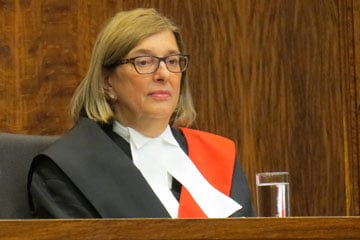

A much-anticipated report has recommended broadening the scope of family law to let paralegals provide legal services in some matters.
If implemented by the provincial government and the Law Society of Upper Canada, the report’s recommendations would let paralegals represent clients in court in a number of family law areas, including custody, access and simple child support cases.
“I recognize that the issue of paralegals representing clients in court is one of considerable controversy,” Justice Annemarie Bonkalo said in the report.
Bonkalo is a part-time judge and former chief justice of the Ontario Court of Justice, who was tasked with conducting a review of family law services to assess what can be done to boost access to justice. Among what are expected to be some of the more controversial recommendations is a call for the law society to create a specialized licence for paralegals to provide certain services in family law.
In 2014-15, more than 57 per cent of Ontarians who went through family court, did not have legal representation.
“When I began this review, my own feeling, based on the written submissions I received, was that in-court assistance would not be appropriate and that a line could be reasonably drawn at the courtroom door,” she added.
“As I continued to explore the issues and hear from different communities, it became clear to me that precluding paralegals from appearing in court would be a disservice to clients.”
The report contends that paralegals should also be allowed to represent clients in matters concerning restraining orders, enforcement and simple and joint divorces without property, but draws the line at more complex proceedings.
The report recommends that paralegals should not be allowed to provide services that involve child protection, property, spousal support or relocation. They also would not be able to do anything that involves the Convention on the Civil Aspects of International Child Abduction or complex child support in which discretionary determinations are needed to arrive at an income amount.
Paralegals can currently appear in the Small Claims Court, and the Ontario Court of Justice for Provincial Offences Act infractions.
Bonkalo has also recommended paralegals should not have to seek a judge’s permission before entering court, as it would create uncertainty and would be a disincentive to hiring a paralegal.
“From a practical stand, it may discourage individuals from pursuing the specialized paralegal licence in family law, as it would be frustrating to not be able to provide continuous service to one’s client,” Bonkalo said.
“It would be difficult to explain to a client that one could assist the client with filling out forms and preparing for court but that, where the client perhaps most needed assistance, the paralegal could not enter the courtroom. Such a limitation could very well play into a person’s decision on whether to hire a paralegal.”
Family lawyers have voiced concerns that they could be pushed out of the market if paralegals are given the right to provide legal services in any part of family law. Opponents have also said that family law is a very complex area, in which even tasks that seem simple can have serious consequences and can lead to more complicated matters. Family lawyers have also said paralegals simply do not have the same training and called for the government to let other reforms play out before considering widening the scope of the area.
The report, which was commissioned by the provincial government and the law society, also recommends that the regulator take steps to facilitate collaboration between lawyers and paralegals to create referral networks and interdisciplinary teams.
“After reading all the written submissions and hearing the diverse views expressed, it is clear to me that unrepresented litigants in family law need more options in obtaining legal assistance to resolve their family disputes,” she said in the report.
Bonkalo has submitted the report to MAG and the law society, who will now determine the next steps needed to implement its recommendations.
In statement responding to the report, Attorney General Yasir Naqvi said the provincial government will be working over the coming months with the law society and the federal government to create an action plan for the recommendations.
"Over half of Ontarians who use the family law system do not have legal representation, and the problem is growing,” he said in the statement.
"It is more important than ever that we work to improve access to justice for families. Our government is ready to act. We are committed to working with our partners and the federal government to consider changes that will have a real, positive impact of people’s lives, like allowing paralegals to be trained to provide family law services."